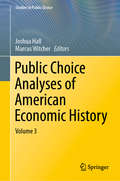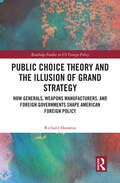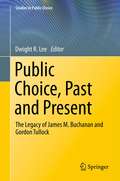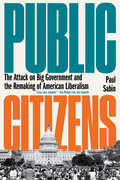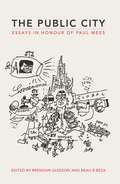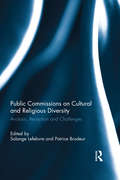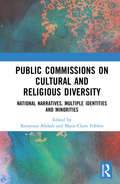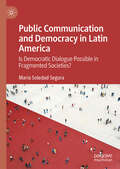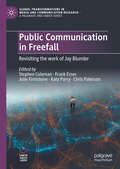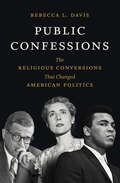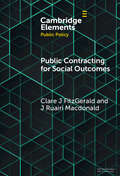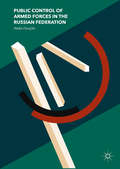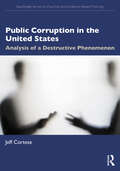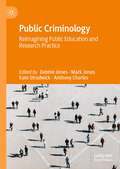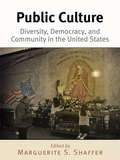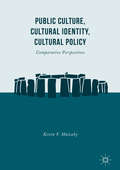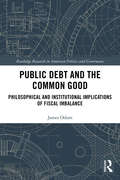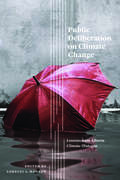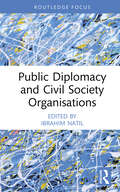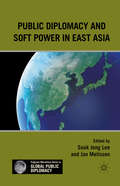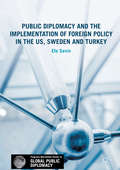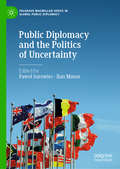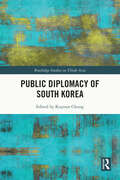- Table View
- List View
Public Choice Analyses of American Economic History: Volume 3 (Studies in Public Choice #39)
by Joshua Hall Marcus WitcherThis book is the third installment in a series of volumes looking at episodes in American economic history from a public choice perspective. Each chapter discusses citizens, special interests, and government officials responding to economic incentives in both markets and politics. In doing so, the book provides fresh insights into important periods of American history, from the Rhode Island’s 1788 Referendum on the U.S. Constitution and the political influence of women’s clubs in the United States. The volume features economic historians such as Ruth Wallis Herndon, junior public choice scholars such as Jayme Lemke and Leo Krasnozhon, and political scientists such as Michael Faber. This volume will be useful for researchers and students interested in economics, history, political science, economic history, public choice, and political economy.
Public Choice III
by Dennis C. MuellerThis book represents a considerable revision and expansion of Public Choice II (1989). Six new chapters have been added, and several chapters from the previous edition have been extensively revised. The discussion of empirical work in public choice has been greatly expanded. As in the previous editions, all of the major topics of public choice are covered. These include: why the state exists, voting rules, federalism, the theory of clubs, two-party and multiparty electoral systems, rent seeking, bureaucracy, interest groups, dictatorship, the size of government, voter participation, and political business cycles. Normative issues in public choice are also examined including a normative analysis of the simple majority rule, Bergson-Samuelson social welfare functions, the Arrow and Sen impossibility theorems, Rawls's social contract theory and the constitutional political economy of Buchanan and Tullock.
Public Choice Theory and the Illusion of Grand Strategy: How Generals, Weapons Manufacturers, and Foreign Governments Shape American Foreign Policy (Routledge Studies in US Foreign Policy)
by Richard HananiaThis book argues that while the US president makes foreign policy decisions based largely on political pressures, it is concentrated interests that shape the incentive structures in which he and other top officials operate. The author identifies three groups most likely to be influential: government contractors, the national security bureaucracy, and foreign governments. This book shows that the public choice perspective is superior to a theory of grand strategy in explaining the most important aspects of American foreign policy, including the war on terror, policy toward China, and the distribution of US forces abroad. Arguing that American leaders are selected to respond to public opinion, not necessarily according to their ability to formulate and execute long-terms plans, the author shows how mass attitudes are easily malleable in the domain of foreign affairs due to ignorance with regard to the topic, the secrecy that surrounds national security issues, the inherent complexity of the issues involved, and most importantly, clear cases of concentrated interests. The book will be of interest to students and scholars of American Studies, Foreign Policy Analysis and Global Governance.
Public Choice, Past and Present
by Dwight R. LeeIn 1962, economists James M. Buchanan and Gordon Tullock published The Calculus of Consent, in which they developed the principles of public choice theory. In the fifty years since its publication, the book has defined the field and set the standard for research and analysis. To celebrate a half-century of scholarship in public choice, Dwight Lee has assembled distinguished academics from around the world to reflect on the influence of this monumental publication, and, more broadly, the legacy of its legendary authors. Their essays cover a broad spectrum of topics and approaches, from the impact of public choice theory on foreign policy analysis to personal remembrances of learning from and collaborating with Buchanan and Tullock. The result is a unique collection of insights that celebrate public choice and its visionary proponents, while considering its future directions.
Public Citizens: The Attack On Big Government And The Remaking Of American Liberalism
by Paul Sabin“Crisp, clear, eloquent.” –Kim Phillips-Fein, New Republic An “elegantly argued and meticulously documented” (Timothy Noah, New York Times Book Review) account of the postwar struggle over the proper role of citizens and government in American society. In the 1960s and 1970s, an insurgent attack on traditional liberalism took shape in America. It was built on new ideals of citizen advocacy and the public interest. Environmentalists, social critics, and consumer advocates like Rachel Carson, Jane Jacobs, and Ralph Nader crusaded against what they saw as a misguided and often corrupt government. Drawing energy from civil rights protests and opposition to the Vietnam War, the new citizens’ movement drew legions of followers and scored major victories. Citizen advocates disrupted government plans for urban highways and new hydroelectric dams and got Congress to pass tough legislation to protect clean air and clean water. They helped lead a revolution in safety that forced companies and governments to better protect consumers and workers from dangerous products and hazardous work conditions. And yet, in the process, citizen advocates also helped to undermine big government liberalism—the powerful alliance between government, business, and labor that dominated the United States politically in the decades following the New Deal and World War II. Public interest advocates exposed that alliance’s secret bargains and unintended consequences. They showed how government power often was used to advance private interests rather than restrain them. In the process of attacking government for its failings and its dangers, the public interest movement struggled to replace traditional liberalism with a new approach to governing. The citizen critique of government power instead helped clear the way for their antagonists: Reagan-era conservatives seeking to slash regulations and enrich corporations. Public Citizens traces the history of the public interest movement and explores its tangled legacy, showing the ways in which American liberalism has been at war with itself. The book forces us to reckon with the challenges of regaining our faith in government’s ability to advance the common good.
Public City: Essays in Honour of Paul Mees
by Brendan Gleeson Beau B BezaPaul Mees' urban ideal counted on watchful, confident and well-informed citizenry to work collectively in a quest for fair and just cities. As such, The Public City is largely a critique of neo-liberalism and its arguably negative influence on urban prospects. As Mees explained it, neo-liberal urbanism was much more than a political aberration; it was a threat that imposed many costly failures in an age overshadowed by grave ecological challenges.Fifteen of Australia and New Zealand's leading urban scholars, including Professor Emeritus Jean Hillier and Professor Brendan Gleeson, have contributed to this collection.The Public City includes a foreword by the late Professor Sir Peter Hall, a world leader in urban planning from Britain. Kenneth Davidson, one of Australia's top economic columnists, has also contributed a chapter. The collective works in this book extend beyond an analysis of urban patterns to provide a blueprint for the improvement of civic and institutional purpose in the creation of the public city.
Public Commissions on Cultural and Religious Diversity: Analysis, Reception and Challenges
by Solange Lefebvre Patrice BrodeurDue to growing negative perceptions about relations between historically entrenched, dominant populations and various minority groups, issues relating to the need to better manage cultural and religious diversity have been intensifying in many countries. These negative perceptions have recently led to a significant increase in popular support for right and extreme right nationalist discourses, and have created so much public tension that national governments have had no choice but to respond. In the last two decades, in several Western contexts in particular, the issues raised by such combined challenges have culminated in the creation of government-initiated or private national commissions. This book presents the results of a multidisciplinary analysis, from a broader framework that includes the national public commissions which have addressed the challenges of managing cultural and religious diversity in Belgium, Britain, Canada (Quebec), France, Morocco and Norway (including also other cases of public management in Australia and Singapore). It includes in-depth studies of the issues and controversies examined by each of the commissions, such as the ways they perceived the issues, their results and impact, the key political players involved, the media debates and reception surrounding each commission, the communication strategies and difficulties their leaders encountered, as well as the legal aspects each commission has raised. The reports represent a rich body of work charting the fundamental questions nations face about their nature, history and future while the impact on peoples’ lives tells us much about different approaches to the issues of cultural identity between countries.
Public Commissions on Cultural and Religious Diversity: National Narratives, Multiple Identities and Minorities
by Marie-Claire Foblets Katayoun AlidadiIn several Western countries, expert commissions composed of academics, public figures, politicians and community organisers have been established by governments or civil society to reflect on the changes and challenges of an increasingly plural society. Commission recommendations on how to ‘manage’ diversities successfully have shaped national narratives and affected law and public policies, yet research on the workings of such commissions remains rare. This book focuses on the experiences of expert commissions in the UK, France, Quebec and Belgium. Furthering the debate on commissions’ potential and limitations it draws on the first-hand experiences and introspection of former commission members and close observers, along with outside perspectives and critique from independent scholars. Building on its companion volume (Public Commissions on Cultural and Religious Diversity: Analysis, Reception and Challenges), this book engages with core concepts of identity, nationality, citizenship, freedom, equality and accommodation. It will appeal to researchers and students of public policy, sociology, anthropology, law, religion, politics, history and migration studies, as well as policymakers and anyone with a general interest in current debates on ethnic, cultural and religious diversity.
Public Communication and Democracy in Latin America : Is Democratic Dialogue Possible in Fragmented Societies?
by María Soledad SeguraThe book examines alternatives proposed and implemented by governments, civil society organizations, social movements and companies in Latin America to democratize public communication and overcome its current problems, such as the dissemination of alternative facts and fake news, anti-scientific discourse, harassing, discriminatory and hate speech, anti-human rights and anti-democracy discourses, and the contempt for political correctness. Drawing on theoretical approaches from media and communication, political studies and sociology, the book identifies strengths and weaknesses of the strategies for promoting democratic dialogue in Latin America and globally.
Public Communication in Freefall: Revisiting the work of Jay Blumler (Global Transformations in Media and Communication Research - A Palgrave and IAMCR Series)
by Stephen Coleman Frank Esser Katy Parry Julie Firmstone Chris PatersonThis book addresses key challenges facing global political communication at a time in which transformations in political practice, media ecology and cultural expectations both threaten traditional democratic norms and point to potential new ways of enacting political democracy. Drawing upon the outstanding theoretical insights of Jay Blumler to our understanding of the norms and practices of political communication, but also critically interrogating and updating them where appropriate, the volume asks timely questions about what publicness and democracy mean in the 2020s. Many people are talking and writing about the crisis of political democracy, fewer are talking about the role of the media in relation to that crisis. While many scholars have responded in an ad hoc way to the various crises of populism, polarisation, mis and disinformation, this book shows how Jay Blumler’s scholarship provides us with the tools and framework to research and understand the changing communication environment systemically and rigorously. The book demonstrates the applicability and relevance of Blumler’s work in explicating the current crisis of communication and the need for fresh and radical thinking in tackling it. The book's breadth and depth of chapters from a broad range of scholars from the East and West, ranging from long-standing contributors to the field to those in the early stages of their career, combine to produce a thoughtful and provocative invitation to reflect upon the concept of a ‘crisis of public communication’. We expect this book to become a major source for political communication students and scholars.
Public Confessions: The Religious Conversions That Changed American Politics
by Rebecca L. DavisPersonal reinvention is a core part of the human condition. Yet in the mid-twentieth century, certain private religious choices became lightning rods for public outrage and debate. Public Confessions reveals the controversial religious conversions that shaped modern America. Rebecca L. Davis explains why the new faiths of notable figures including Clare Boothe Luce, Whittaker Chambers, Sammy Davis Jr., Marilyn Monroe, Muhammad Ali, Chuck Colson, and others riveted the American public. Unconventional religious choices charted new ways of declaring an "authentic" identity amid escalating Cold War fears of brainwashing and coercion. Facing pressure to celebrate a specific vision of Americanism, these converts variously attracted and repelled members of the American public. Whether the act of changing religions was viewed as selfish, reckless, or even unpatriotic, it provoked controversies that ultimately transformed American politics.Public Confessions takes intimate history to its widest relevance, and in so doing, makes you see yourself in both the private and public stories it tells.
Public Contracting for Social Outcomes (Elements in Public Policy)
by Clare J. FitzGerald J. Ruairi MacdonaldGovernments all over the world have transitioned away from directly providing public services to contracting and collaborating with cross-sectoral networks to deliver services on their behalf. Governments have thus pursued an array of policy instruments to improve interorganizational progress towards policy goals. In recent years, outcomes-based contracting has emerged as a compelling solution to service quality shortcomings and collective action challenges. Informed by public policy, public administration, and public procurement scholarship, this Element details the evolution of social outcomes in public contracting, exploring the relationship between how outcomes are specified and managed and how well such instruments deliver against policy goals. It comments on the possible drawbacks of contracting for social outcomes, highlighting how governments may use outcomes as an excuse to avoid actively managing contracts or to sidestep their accountability as outlined in public law. This title is also available as Open Access on Cambridge Core.
Public Control of Armed Forces in the Russian Federation
by Nadja DouglasThe volume deals with the fundamentals of the contemporary relations between civic actors and state power structures. The main focus lies on public control of armed forces and the question of why civilians should have a vigilant eye on the military institution as well as the civilian authority that legitimizes the use of force. Based on the example of conscription and recruitment as an intersection between the military and society, this study engages in an analysis of institutional change in the politico-military field in post-Soviet Russia. Taking a critical stance on conventional military sociology, the book shifts the focus away from the exclusive power relationship between political and military elites in the context of national security. Instead, it takes into consideration human and societal security, i. e. the needs and demands of individuals and groups at the grassroots level, affected by the military and the prevailing security situation in Russia. The book addresses readers with an interest in civil-military relations, contemporary Russian affairs, and social movement theories.
Public Corruption in the United States: Analysis of a Destructive Phenomenon (Routledge Series on Practical and Evidence-Based Policing)
by Jeff CortesePublic Corruption in the United States provides a comprehensive view of public corruption, including discussion on its types, methods, trends, challenges, and overall impact. It is the first book of its kind to examine in plain language the breadth of criminal public corruption in the United States, not just at a superficial level, but in a deeper context. By critically examining acts of corruption of elected, appointed and hired government officials (legislators, law enforcement, judges, etc.) at the local, state, and federal levels, the reader gains insight into the inner workings of corruption, including its relationship to terrorism and organized criminal networks. Using simple language and easy-to-understand examples, this book is about empowering investigators, compliance professionals, educators, public officials, and everyday citizens who seek to better serve, support, and protect their communities and their country.
Public Criminology: Reimagining Public Education and Research Practice
by Anthony Charles Mark Jones Debbie Jones Kate StrudwickThis book discusses the role and impact of ‘Public Criminology’. It brings together a collection of key scholars who have been at the fore of empirical and practice work in relation to understanding how ‘Public Criminology’ can engender academic activism. Split into two parts, it focusses on academic activism and research methodologies, and public criminology and pedagogical practice. It includes chapters on a range of topics including Inside-Out teaching, it discusses the role of social scientists and stepping outside of established research practices, and how students, the public and children can be engaged in criminological learning and issues to become agents of social change. It includes a reflection on how ‘Public Criminology’ has developed both in the UK and USA. It speaks to students, researchers and academics alike involved in teaching and learning within the discipline of Criminology and those who wish to evaluate practice and ensure their interventions have impact on commissioners and policymakers.
Public Culture
by Marguerite S. ShafferIn the United States today many people are as likely to identify themselves by their ethnicity or region as by their nationality. In this country with its diversity and inequalities, can there be a shared public culture? Is there an unbridgeable gap between cultural variety and civic unity, or can public forms of expression provide an opportunity for Americans to come together as a people?In Public Culture: Diversity, Democracy, and Community in the United States, an interdisciplinary group of scholars addresses these questions while considering the state of American public culture over the past one hundred years. From medicine shows to the Internet, from the Los Angeles Plaza to the Las Vegas Strip, from the commemoration of the Oklahoma City bombing to television programming after 9/11, public sights and scenes provide ways to negotiate new forms of belonging in a diverse, postmodern community. By analyzing these cultural phenomena, the essays in this volume reveal how mass media, consumerism, increased privatization of space, and growing political polarization have transformed public culture and the very notion of the American public.Focusing on four central themes--public action, public image, public space, and public identity--and approaching shared culture from a range of disciplines--including mass communication, history, sociology, urban studies, ethnic studies, and cultural studies--Public Culture offers refreshing perspectives on a subject of perennial significance.
Public Culture, Cultural Identity, Cultural Policy
by Kevin V. MulcahyThis book places the study of public support for the arts and culture within the prism of public policy making. It is explicitly comparative in casting cultural policy within a broad sociopolitical and historical framework. Given the complexity of national communities, there has been an absence of comparative analyses that would explain the wide variability in modes of cultural policy as reflections of public cultures and cultural identity. The discussion is internationally focused and interdisciplinary. Mulcahy contextualizes a wide variety of cultural policies and their relation to politics and identity by asking a basic question: who gets their heritage valorized and by whom is this done? The fundamental assumption is that culture is at the heart of public policy as it defines national identity and personal value.
Public Debt and the Common Good: Philosophical and Institutional Implications of Fiscal Imbalance (Routledge Research in American Politics and Governance)
by James OdomThe American national debt stands at $20.49 trillion as of January 2018, or roughly $63,000 for every person in the United States. The national debt has grown six-fold in the past 25 years, and borrowing only has accelerated in recent administrations. What are the factors driving such unrestrained borrowing? Is American fiscal policy different now than in an earlier era? Is there a moral dimension to public debt and, if so, how can that dimension be measured? Public Debt and the Common Good addresses these and other questions by looking to the fiscal policy of the American states. Drawing on classical themes and the longest quantitative review of state debt in the literature, James Odom expertly integrates institutional analysis with dimensions of culture to define the parameters of political freedom in a theoretically coherent way. In doing so, Odom argues that centralization and injustice, or the incapacity for the common good, can help explain state indebtedness. Contributing to ongoing scholarly debates on public debt theory, this book will be of interest to students, scholars, and practitioners who work at the intersection of political philosophy and economics, as well as those who specialize in state public policy, state politics, and federalism more generally.
Public Deliberation on Climate Change: Lessons from Alberta Climate Dialogue
by Lorelei L. Hanson David KahaneThere exists in both academic and political circles a growing interest in public deliberation as an alternative to the sometimes adversarial and polarizing public engagement activities that result in the pitting of experts against lay people. Proponents of public deliberation claim that a more deliberative process can engage a diversity of participants in a more guided process that better balances expert knowledge and citizen inclusion. Such an approach holds particular promise where citizens and governments engage in discussions of the most complex and intractable issues like climate change. Given the host of challenges climate governance presents and the global consequences of our response to them, the experience and knowledge shared by Hanson and the contributors to Public Deliberation on Climate Change provide an important framework for advancing public conversations and processes on this and other wicked problems. The lessons contained in the volume were gained as a result of a five year multidisciplinary, community, university research project called Alberta Climate Dialogue (ABCD), which drew together scholars, practitioners, citizens, civil society members, and government officials from across Alberta at four public deliberations. By highlighting the value tensions and trade-offs and examining the impact that the design of the deliberations has on policy and the creation of conditions that encourage exchange, the contributors aim to build capacity within our institutions and society to find new ways to discuss and solve complex problems.
Public Diplomacy and Civil Society Organisations (Routledge Explorations in Development Studies)
by Ibrahim NatilThis book explores the roles of civil society organisations (CSOs) when engaging in public diplomacy activities and their impact on community development and change. It provides up-to-date analysis of the challenges and constraints facing CSOs involved in diplomatic missions and working with foreign donors. Bringing together case studies from Cameroon, Egypt, Poland, Palestine, Lebanon and Libya, this edited collection reflects on how external calls for proposals in the fields of women’s empowerment, community development, education, training, exchange programmes, democracy, human rights and peacebuilding influence the way civil society organisations contribute, deliver, intervene and position themselves in various societies. It explores the lessons learnt by various CSOs in identifying societal problems, understanding grassroots demands, prioritising development agendas and campaigning for peacebuilding. Grounded in a firm theoretical framework and based on up-to-date empirical research, the book reflects on the leadership shown by civil society organisations in development, politics and business and their impact on community development initiatives and local change process. This book will be an important resource for researchers, policymakers, donors, NGO practitioners and the beneficiaries themselves, within the areas of international development, peacebuilding, civil society, politics and international relations.
Public Diplomacy and Soft Power in East Asia
by Sook Jong Lee Jan MelissenThis book discusses the question of soft power and public diplomacy challenges in East Asian context. Both concepts originate in the West, and in a sense this book can therefore be seen as an exercise in critically assessing soft power and public diplomacy in a different geographical and cultural setting.
Public Diplomacy and the Implementation of Foreign Policy in the US, Sweden and Turkey
by Efe SevinThis book presents a comprehensive framework, the six pathways of connection, which explains the impact of public diplomacy on foreign policy by studying how a public diplomacy project is designed to contribute to the achievement of a related foreign policy goal. Based on a comparative study of three important public diplomacy practitioners with distinctive challenges and approaches-the US, Sweden, and Turkey-the book shows the necessity to move beyond soft power to appreciate the role of public diplomacy in global politics. First, the author lays the theoretical foundations of the framework through a survey of scholarly works related to public diplomacy. He then further develops it by analyzing how the American, Swedish, and Turkish practitioners design and implement their public diplomacy projects. Finally, the book explains how the framework can be used to design new public diplomacy projects and measure their impact on foreign policy.
Public Diplomacy and the Implementation of Foreign Policy in the US, Sweden and Turkey (Palgrave Macmillan Series in Global Public Diplomacy)
by Efe SevinThis book presents a comprehensive framework, six pathways of connection, which explains the impact of public diplomacy on achieving foreign policy goals. The comparative study of three important public diplomacy practitioners with distinctive challenges and approaches shows the necessity to move beyond soft power to appreciate the role of public diplomacy in global politics. Through theoretical discussions and case studies, six pathways of connection is presented as a framework to design new public diplomacy projects and measure their impact on foreign policy.
Public Diplomacy and the Politics of Uncertainty (Palgrave Macmillan Series in Global Public Diplomacy)
by Ilan Manor Paweł SurowiecThis edited book explores the multi-layered relationships between public diplomacy and intensified uncertainties stemming from transnational political trends. It is the latest wave of political uncertainty that provides the background as well as yields evidence scrutinised by authors contributing to this book. The book argues that due to a state of perpetual crises, the simultaneity of diplomatic tensions and new digital modalities of power, international politics increasingly resembles a networked set of hyper-realities. Embracing multi-polar competition, superpowers such as Russia flex their muscles over their neighbours; celebrated ‘success stories’ of democratisation – Hungary, Poland and Czechia – move towards illiberal governance; old players of international politics such as Britain and America re-claim “greatness”, while other states, like China, adapt expansionist foreign policy goals. The contributors to this book consider the different ways in which transnational political trends and digitalisation breed uncertainty and shape the practice of public diplomacy.
Public Diplomacy of South Korea (Routledge Studies on Think Asia)
by Kuyoun ChungThis book introduces South Korea’s public diplomacy and identifies and evaluates the goals and corresponding areas of. It discusses implication for the foreign policy of the current Yoon Suk Yeol administration under the competitive geopolitical landscape.By establishing political diplomacy, economic diplomacy, and public diplomacy as the three pillars of its diplomacy, South Korea has endeavored to enhance its international image and credibility, deepen foreign nationals’ understanding of South Korea’s foreign policy, and expand its soft power across the international community. However, as current U.S.–China competition continues to expand to the domains of the political system and its organizing values, middle powers are struggling to hedge the risk of competition between liberalism and anti-liberalism, which closely relates to every middle power’s state identity and potential coalitions used to pursue certain value via public diplomacy. With that context, the contributions to the book examine the public diplomacy of South Korea and its achievement, the range of domains that it prioritizes, and future directions for such diplomacy amid the competition of great powers. Focusing on the Yoon Suk-Yeol administration’s foreign policy goals and how public diplomacy has been adapted to this framework under the intensifying great power competition between the U.S. and revisionist powers, the book addresses the ideological dimension in the ongoing power to explain how countries’ respective alignments could affect South Korea’s ability to conduct public diplomacy.This book is a novel contribution to the field and will be of interest to researchers in international relations, South Korean foreign policy, and Asian politics.
